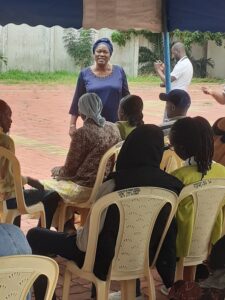By Caroline Katana
In early times, children born with disabilities were hidden and sometimes even killed, feelings of shame and guilt were often associated with giving birth to a child with a disability.
Sometimes the disability was blamed on the sins of family members, and even as people with disabilities became more accepted, society viewed disability as a personal tragedy with which the individual and family must cope.
Feelings of pity and actions of charity were typically evoked in others, even successful individuals such as Franklin D. Roosevelt tried to hide their disabilities.
Organizations focused on the prevention and cure of disabilities, successful funding campaigns, even to this day often share images of helpless children with disabilities doomed to a miserable life.
In the 40s and 50s parents organized and advocated for education and services for their children with disabilities, but the children were not routinely encouraged to advocate for themselves.
Children with disabilities rarely encounter successful adults with disabilities.
Self –determination and independence
The Council for Exceptional Children CEC along with many other professional organizations and parent groups, embraces instruction in self –determination as a way to improve academic and career outcomes for youth with disabilities.
Self-determination is also promoted in legislative mandates, for example the Individuals with Disabilities Education Act requires that students with disabilities actively participate in their transition planning and that their preferences and interests be considered, it affirms the right of people with disabilities to self –determination.
Growing evidence suggests that enhanced self-determination skills enable students with disabilities to perform more effectively in academic studies and thus support the goals of No Child Left Behind legislation and standards-based school reform.
Disability focal point
According to the Kenya National Commission on Human Rights, Kenya ratified the convention on the rights of persons with disabilities CRPD on 19th May 2008 creating an obligation upon Kenya to respect, protect, and fulfill the provisions in the Convention.
Disability inclusion
Persons with disabilities constitute 2.2 percent of Kenya’s population, with women making up 57 percent (523,883) of all persons with disabilities.
The common types of disability are mobility 42 percent, followed by visual 36.4 percent, cognition 23.2 percent, hearing 16.7 percent, self-care 15.3 percent, and communication 12.1 percent.
More than 80 percent of persons with disabilities live in rural areas according to KPHC, report 2019.
Social and gender norms, misconceptions, and negative attitudes around disability are some of the leading causes of the marginalization of persons with disabilities.
Women and children with disabilities continue to face various challenges in accessing sexual and reproductive health services.
The national fund for the disability of Kenya
Since The National Fund for the Disabled of Kenya (NFDK) was established in 1980, the board of trustees and management have continually sought to fulfill the fund’s mandate, with deliberate efforts being made to safeguard the assets and increase revenues for the benefit of persons with disabilities in Kenya.
The national fund for the disabled of Kenya was registered on 7th July 1981 after a funds drive which raised Kshs 20,768,363.15 in aid of persons with disabilities was held on 4th October.
Today the fund’s impact on the socio-economic empowerment of persons with disability is evident nationally through its economic and livelihood program and flagship projects in learning institutions spread throughout Kenya.
Speaking during the launch Coast Region empowerment program for start-ups and educational grants to institutions catering to learners with disabilities at Uluru na Kazi in Mombasa County, NFDK board of Trustees chairperson Kristina Kenyatta Pratt, said that the Fund has allocated Kshs. 4,849, 867.31 to Coast Region.
“Today, we shall be giving out grants to 8 institutions of learning across this region totaling to Kshs. 1,600,000 (One million, six hundred thousand) also present trade tools worth Kshs. 724,040 to 21 individuals drawn from Nyali and Mvita Sub- counties,” said Pratt.
Pratt added that Coast Region has benefitted from the NFDK Flagship program with 18 institutions of learners with disabilities receiving projects worth Kshs. 44,873,300 (Approx. Forty-five million shillings) The projects include dormitories, dining halls, ICT labs, and classrooms.
“Such livelihood opportunities go a long way in breaking down barriers both Physical and attitudinal attached to the capacities of persons with disabilities and challenge perceptions that persons with disabilities are either unable to work or cannot be accommodated in the workplaces,” said Pratt.
The chairperson added that the Fund continues to improve the facilities and infrastructure in institutions that cater to learners with disability to build capacity and better service to the learners.
“Such facilities provide safe, nonviolent, inclusive, and effective learning environments. Despite remarkable progress especially in policies geared to expanding access to education, it’s unfortunate that many children with disabilities are still being left behind,” she added.
She appealed to all beneficiaries, who applied for, whether a grant, tool of trade, or assistive device, to use it for the intended purpose saying the board of trustees shall follow up and monitor your progress in business/start-up. For the institutions, you will account for the utilization of the grants.
Hellen Kagwiria from Nyali constituency who benefited from saloon kits applauded NFDK for supporting the PWDs community to boost their livelihood.
“For a long time people living with disabilities were left behind in terms of development due to stigmatization for being associated with curses and witchcraft, but today I’m happy for this support. I believe this will change the page of my life,” she said.
At the same time, she challenged the PWD community to come out and ensure they are registered with NFDK for support.
Catherine Kasyoka Mutua, a second-time beneficiary of salon equipment said NFDK support has changed her financial status unlike before.
Deputy Coast Regional Commissioner Mbogo Mathioya challenged county governments to come up with amicable plans to ensure people living with disabilities on the streets are registered with relevant organizations for support instead of being commercial beggars.

